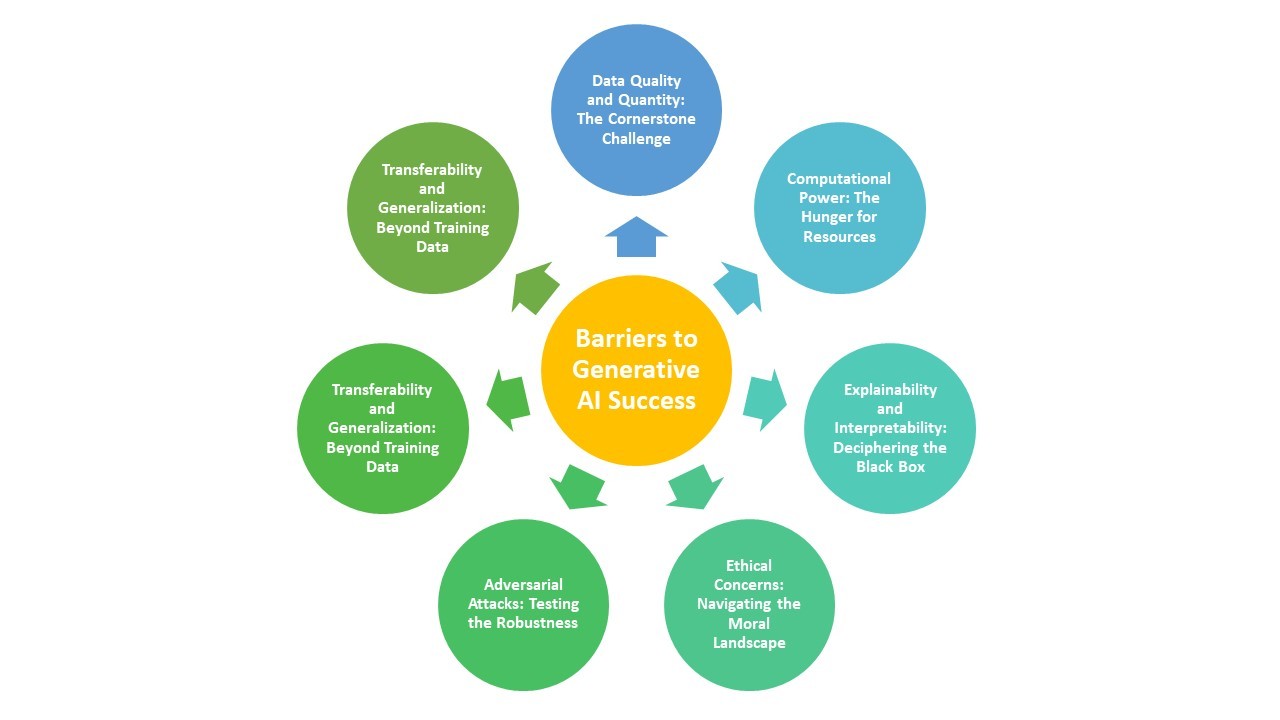Comments
- No comments found

Generative Artificial Intelligence (AI) has emerged as a transformative force, revolutionizing various industries and domains.
From creating realistic images and text to aiding in drug discovery, the capabilities of generative AI have expanded exponentially. However, despite its promising potential, the journey to generative AI success is riddled with intricate challenges. We delve into the biggest barriers obstructing the seamless evolution of generative AI, exploring the technological, ethical, and societal complexities that must be navigated.

The foundation of any successful AI model is laid upon a robust dataset. For generative AI, this requirement becomes even more crucial as it aims to mimic and create content akin to human intelligence. The scarcity of high-quality, diverse datasets poses a significant challenge. In many cases, biases present in training data can be inadvertently learned and perpetuated by the generative models, leading to biased outputs that mirror the shortcomings of the input data.
Moreover, the sheer quantity of data required for training deep generative models is colossal. Large-scale datasets demand substantial computational resources and storage, often proving to be a bottleneck for smaller organizations or research groups with limited access to such infrastructure.
Addressing this challenge involves meticulous curation of datasets, ensuring representativity, diversity, and a conscious effort to eliminate biases. Additionally, the development of techniques that allow more efficient learning from limited data can potentially alleviate the burden associated with the quantity of data required.
Generative models, particularly deep neural networks like GANs (Generative Adversarial Networks) and transformers, are voracious consumers of computational power. Training these models necessitates extensive hardware resources, such as powerful GPUs and TPUs, which can be expensive and environmentally taxing. The energy consumption associated with training large-scale generative models raises concerns about the environmental impact and sustainability of AI research.
Efforts are underway to develop more energy-efficient algorithms and hardware solutions. Researchers are exploring techniques like model distillation, quantization, and pruning to reduce the computational demands without sacrificing the model's generative capabilities. Additionally, the exploration of alternative hardware architectures, such as neuromorphic computing, holds promise in mitigating the computational challenges posed by generative AI.
Generative AI models, especially deep neural networks, are often criticized for their lack of interpretability. The inherent complexity of these models results in a "black box" phenomenon, where understanding the rationale behind their decisions becomes elusive. In applications where accountability and transparency are crucial, such as healthcare or finance, the lack of explainability can hinder the deployment of generative AI systems.
Addressing this barrier requires the development of interpretability tools and techniques tailored for generative models. Researchers are exploring methods to extract meaningful insights from the internal workings of these models, ranging from feature visualization to generating human-understandable justifications for model outputs. Striking a balance between the complexity of the model and its interpretability remains a key challenge in unlocking the full potential of generative AI.
The rise of generative AI has brought forth a myriad of ethical concerns, ranging from privacy issues to the generation of malicious content. Deepfakes, for instance, leverage generative technology to create hyper-realistic videos or audio recordings that can be indistinguishable from genuine ones. This raises concerns about the potential misuse of generative AI for misinformation, fraud, or even political manipulation.
The ethical challenges extend to issues of bias and fairness in generated content. If the training data is biased, the generative model is likely to produce biased outputs, perpetuating and potentially exacerbating existing societal prejudices. Tackling these ethical concerns requires a multi-faceted approach, involving rigorous guidelines, regulations, and ongoing research to develop ethical frameworks for the responsible deployment of generative AI.
Generative models, particularly those based on neural networks, are vulnerable to adversarial attacks. These attacks involve manipulating the input data in subtle ways to deceive the model into producing incorrect or undesired outputs. Adversarial attacks pose a significant threat in real-world applications, especially in security-critical domains like autonomous vehicles or medical diagnostics.
Addressing the vulnerability of generative models to adversarial attacks requires the development of robust and resilient architectures. Techniques such as adversarial training, where models are exposed to adversarial examples during training, can enhance their ability to withstand such attacks. Moreover, ongoing research focuses on understanding the vulnerabilities of generative models and devising countermeasures to fortify them against adversarial manipulation.
Generative models often struggle with transferring their learned knowledge to new domains or scenarios not adequately represented in the training data. This lack of transferability limits the practical applicability of generative AI, especially when faced with real-world variability and unpredictability.
Researchers are actively exploring techniques to improve the generalization capabilities of generative models. Transfer learning, meta-learning, and domain adaptation methods aim to equip generative models with the ability to adapt and generate meaningful content in diverse settings. Overcoming this barrier is crucial for the widespread adoption of generative AI across a spectrum of industries and applications.
The rapid evolution of generative AI has outpaced the development of comprehensive legal frameworks to govern its usage. Intellectual property concerns arise when generative models create content that resembles existing copyrighted material, leading to questions about ownership and attribution. The legal landscape surrounding liability for generated content, especially in cases of misinformation or malicious use, remains ambiguous.
Addressing these legal and regulatory challenges requires collaboration between policymakers, legal experts, and the AI community. Establishing clear guidelines for ownership, attribution, and liability in the context of generative AI is essential to foster innovation while safeguarding against potential legal pitfalls.
Generative AI stands at the forefront of technological innovation, offering transformative potential across various domains. However, realizing this potential requires overcoming a myriad of challenges, ranging from technical hurdles to ethical and legal considerations. Researchers and practitioners in the field are actively engaged in addressing these barriers, pushing the boundaries of what generative AI can achieve.
As the field continues to evolve, collaboration between academia, industry, and regulatory bodies becomes increasingly crucial. By fostering a multidisciplinary approach that encompasses technological advancements, ethical guidelines, and legal frameworks, we can pave the way for the responsible and beneficial deployment of generative AI, unlocking its full potential to shape the future of artificial intelligence.
Ahmed Banafa is an expert in new tech with appearances on ABC, NBC , CBS, FOX TV and radio stations. He served as a professor, academic advisor and coordinator at well-known American universities and colleges. His researches are featured on Forbes, MIT Technology Review, ComputerWorld and Techonomy. He published over 100 articles about the internet of things, blockchain, artificial intelligence, cloud computing and big data. His research papers are used in many patents, numerous thesis and conferences. He is also a guest speaker at international technology conferences. He is the recipient of several awards, including Distinguished Tenured Staff Award, Instructor of the year and Certificate of Honor from the City and County of San Francisco. Ahmed studied cyber security at Harvard University. He is the author of the book: Secure and Smart Internet of Things Using Blockchain and AI.
Leave your comments
Post comment as a guest